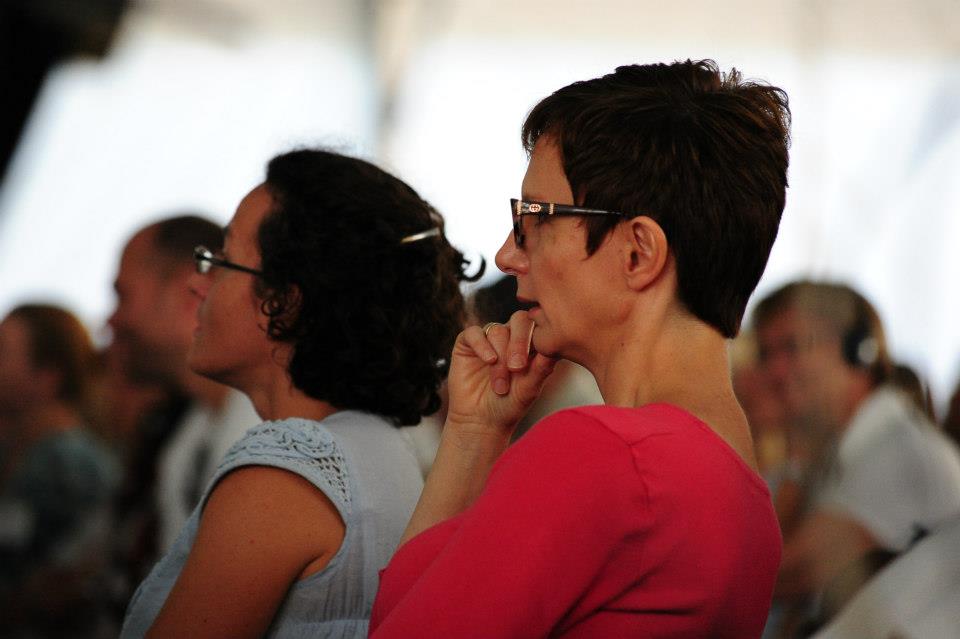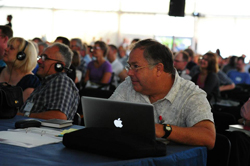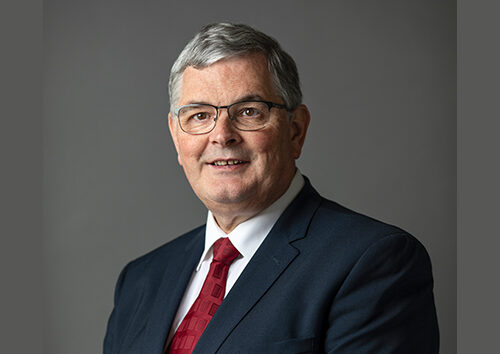Presented by Dennis Meier
23 August, 2012 Rogaška Slatina, Slovenia [John Surridge, tedNEWS] Shunning technology Pastor Dennis Meier, a minister in Hamburg, used a paper flip chart to illustrate his presentation on Acts 3:1-11, the story of Peter and John and the healing of the lame man. This approach was an early indicator of the low-key, European style, that would be used, and it went down well with his congregation. “Just call me Dennis,” he told them.
Dennis’s humour quickly became apparent when he talked about his first experience of preaching. Noting the lack of response he concluded, “whether you preach a sermon or a man from China drops a bag of rice” it doesn’t make a difference. Although this works better as a German idiom the point was well made. Which of the pastors present had not experienced the same thing? Hoping for a miracle, a revolution in the church, the actual response to our sermons is usually somewhat less.
Years later when studying theology, Dennis came across the works of Karl Barth, and one quote in particular helped him to put his preaching into perspective. “We ought to speak of God, but cannot because we are humans and as such we are unable to speak of God.” In other words, Dennis said, I struggle with the task of preaching and being a minister. It’s not something we find easy to talk about. I’d love to tell you about how I went to a church of five people yesterday and how today it has 50 million members. But the fact is that my church has actually shrunk over the eight years that I’ve been a minister there. “If numbers are the measure of success then I am in the wrong place, but if you are in the same position, then, welcome.”
It was clear from the warm response that many in the audience felt the same way and, having established a relationship with them Dennis began his systematic exposition of Acts 3:1-11.
 Five points emerged from the text – things which Peter and John did differently after they had been filled with the Holy Spirit.
Five points emerged from the text – things which Peter and John did differently after they had been filled with the Holy Spirit.
Firstly, said Dennis, they “mingled with the crowd”. They went where the people were. As Adventists we tend to be more comfortable with the metaphor of the light on the hill than the salt in the food. With our established buildings and our structured worship times there is a danger of us becoming isolated. The early church met daily in people’s houses, not as some kind of evangelistic enterprise but simply because their piety was expressed in their everyday lives.
The second key aspect of Peter and John’s ministry was their “seeing”. Though they may have walked past the beggar many times before, this time they really saw him. They saw the potential and they saw a child of God. “We as pastors,” said Dennis, “need to develop the skill of seeing. This is where true vision comes from.”
The issue of seeing is such an important part of ministry that Dennis went further in his discussion of it. True seeing may involve disturbance, he said. Peter and John may have had a plan for the day but they were disturbed. Illustrating the point Dennis told a story of how he had been “disturbed” by a difficult member when visiting a church in South Africa. He didn’t want to spend time with this person but when he was invited back for lunch he became aware of their real needs and eventually was able to break down barriers.
We also need to be open to paradox, as things don’t always work out as we expect them to, Dennis continued. As an example he related how another difficult member had told him, “Ever since I stopped giving tithe my financial problems have all vanished!”
 Seeing should lead to seeking the lost. Some of the most needy people are those whose actions have put them beyond the normal reach of the church. Speaking about those who have stopped attending church Dennis noted that many of these were people who had been through divorces. It’s a subject we don’t like to discuss, and these people, who are emotionally vulnerable, are also given the very clear impression that they are not wanted in church.
Seeing should lead to seeking the lost. Some of the most needy people are those whose actions have put them beyond the normal reach of the church. Speaking about those who have stopped attending church Dennis noted that many of these were people who had been through divorces. It’s a subject we don’t like to discuss, and these people, who are emotionally vulnerable, are also given the very clear impression that they are not wanted in church.
More controversially, Dennis went on to mention homosexuals. To his almost silent audience he made the appeal, “we need to see all of these people“.
Returning to his main exposition Dennis raised the issue of “not having”. As parish pastors we are like general practitioners and it is true that we need to be able to do lots of different things. “But this doesn’t mean that we can good at everything,” he said. “We need to be able to talk about our fears and weakness, remembering that God’s power is made perfect in our weakness”.
But it is the “having” that is the most exciting part of the text, where Peter says, “What I do have I give you. In the name of Jesus Christ of Nazareth, walk.” We need to work with what we have, said Dennis, and we have what Peter and John had: access to a source of power that is unlimited.
Finally, Dennis spoke on the “healing” part of the miracle. “We need to teach our members how to become an accepting church,” he said. “My intent to lead people from the fringes of the church to become committed followers of Jesus. We can only achieve this if we allow the fringes to be present… If all we preach is Laodicea we shouldn’t be surprised if the fringes disappear.”
So as no one could be in any doubt as to what he actually meant by this, Dennis clarified that for him this means: straight and gay, married and co-habiting, meat eating and vegan. All of these should be welcome in our churches.
As the once again subdued audience pondered the implications of this Dennis concluded by saying that, despite the challenges, it is actually the healed beggars that we want in our churches. They are the ones who leap and jump and praise God, and they are also the ones who get the crowds together so that others can find Jesus as well. [tedNEWS]
tedNEWS Staff: Miroslav Pujic, director; Deana Stojkovic, editor; Dragana Selakovic-Duval, Frederic Duval & Tor Tjeransen, photographers
119 St Peter’s Street, St Albans, Herts, AL1 3EY, England
E-mail: [email protected]
Website: www.ted-adventist.org
tedNEWS is an information bulletin issued by the communication department of the Seventh-day Adventist Church in the Trans-European Division.
You are free to re-print any portion of the bulletin without need for special permission. However, we kindly request that you identify tedNEWS whenever you publish these materials.


